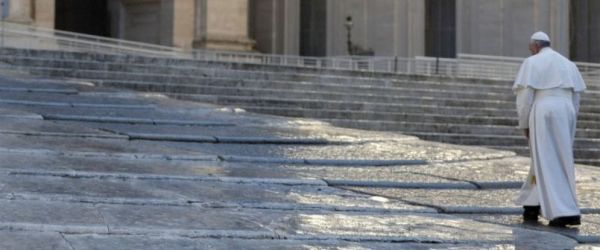Unity in the Church was the focus of Pope Francis' reflection during the Mass celebrated at Santa Marta on Thursday 21 May. Rereading the passage from the Gospel of John (17:20-26) proposed by the liturgy of the day, the Pontiff first of all underlined how "it consoles everyone to hear this word: 'Father, I pray not only for these but also for those who will believe in me through their word'". This is what Jesus said in taking leave of the apostles. At that moment Jesus prayed to the Father for the disciples and "he also prays for us".
Francis pointed out that 'Jesus prayed for us at that time and continues to do so'. We read in the Gospel: 'Father, I pray for these but for many others who will come'. A not insignificant detail to which, perhaps, not enough attention is paid. Yet, the Pope reiterated, "Jesus prayed for me" and this "is indeed a source of trust". We could imagine 'Jesus before the Father, in heaven', praying for us. And "what does the Father see? The wounds', that is, the price that Jesus 'paid for us'.
With this image, the Pontiff entered into the heart of his reflection. Indeed, he wondered, 'what does Jesus ask of the Father in this prayer?' Does he say, "I pray for them that life may be good, that they may have money, that they may all be happy, that they may lack nothing?...". No, Jesus "prays that all may be one: 'As you are in me and I in you'". At that moment he prays "for our unity. For the unity of his people, for the unity of his Church'.
Jesus, Francis explained, knows well that "the spirit of the world, which is precisely the spirit of the father of division, is a spirit of division, of war, of envy, of jealousies", and that this is present "even in families, even in religious families, even in dioceses, even in the whole Church: it is the great temptation". Therefore "the great prayer of Jesus" is to "resemble" the Father: that is, "as you Father are in me and I in you", in the "unity that he has with the Father".
Someone might then ask: "But, Father, with this prayer of Jesus, if we want to be faithful, can we not chatter against one another?" Or: "Can't we label this one ..., this one is like this, this one is ...?". And "that other one, who has been branded a revolutionary...?". The Pope's answer was clear: 'No'. Because, he added, "we must be one, one thing, as Jesus and the Father are one". And this is precisely 'the challenge for all of us Christians: not to leave room for division among us, not to let the spirit of division, the father of lies, enter into us'. We must, the Pope insisted, 'always seek unity'. Everyone of course 'is as he is', but he must try to live in unity: 'Has Jesus forgiven you? Forgive us all'.
The Lord prays that we will succeed in this. The Pontiff explained: 'The Church is in great need, so much, of this prayer of unity, not only that of Jesus; we too must join in this prayer'. After all, from the very beginning the Church has manifested this need: 'If we start reading the book of the Acts of the Apostles from the beginning,' Francis said, 'we will see that there the quarrels begin, even the swindles. One wants to cheat the other, think Ananias and Sapphira...". Already in those early years, divisions, self-interest, selfishness were encountered. Making unity was and is a real "struggle".
However, we must realise that 'alone we cannot' achieve unity: this in fact 'is a grace'. Therefore, the Pontiff reiterated, 'Jesus prays, he prayed at that time, he prayed for the Church, he prayed for me, for the Church, for me to go on this path'.
Unity is so important that, the Pope noted, "in the passage we read" this word is repeated "four times in six verses". A unity that "is not made with glue". There is in fact no such thing as "the Church made with glue": the Church is made one by the Spirit. This is why "we must make room for the Spirit, so that he may transform us as the Father is in the Son, into one".
To achieve this, Francis added, there is a piece of advice given by Jesus himself: "Remain in me. This too is a grace. In his prayer Jesus asks: "Father, I want those you have given me to be with me where I am" so that "they may contemplate my glory".
From this meditation came a piece of advice: to reread verses 20-26 of chapter 17 of John's Gospel and think: "Jesus prays, prays for me, has prayed and prays for me still. He prays with his wounds, before the Father". And he does so 'so that we may all be one, as he is with the Father, for the sake of unity'. This "should urge us not to make judgements", not to do "things that go against unity", and to follow Jesus' advice "to remain in him in this life so that we may remain with him in eternity".These teachings, the Pope concluded, are found in Jesus' discourse during the Last Supper. In the Mass "we relive" that supper and Jesus repeats those words to us. During the Eucharist, therefore, "let us make room for Jesus' words to enter our hearts and all of us to be witnesses of unity in the Church and of joy in the hope of the contemplation of Jesus' glory".
[Pope Francis, S. Marta homily, in L'Osservatore Romano 22/05/2015]












